How To Start A Business With No Ideas + Top Picks For 2024
‘I want to start a business, but have no ideas’. ‘I don’t even know where to start from’… Yes, these are the most common questions I get from people wanting to start something but are too confused.
Well, worries not guys! I got your back. In this blog article, I will help you wake up the entrepreneurial spirit in you.
Also, I will list you the top business ideas to start a business in 2024, and the ones that are working best!
Want to start a business with low investment, and potential for great success? Let’s dive in!


Table of Contents
- Key Takeaways
- How To Start A Business When You Have No Ideas?
- Step 1- Consider Your Passions
- Step 2 – Identify Your Skills
- Step 3 – Define Your Purpose for Starting a Business
- Step 4- Spot Problems to Solve When You Start a Business but Have No Ideas
- Step 5- Create a Business Plan When You Start a Business but Have No Ideas
- Step 6- Try Out Your Ideas on a Small Scale
- Top Business Ideas To Start With in 2024
- The No. 1 Tool for all dropshippers – now with AI
- Most Inspiring Success Stories Of Entrepreneurs Having No Ideas How To Start
- Start A Business With No Ideas -FAQs
- Conclusion
Key Takeaways
- Explore Your Passions – Turn hobbies into business ideas. Your personal interests can guide your entrepreneurial journey and spark creative concepts.
- Leverage Your Skills – Use skills from jobs or hobbies in new ways. This could open doors to unique business opportunities, like teaching or crafting.
- Clarify Your Motivation – Know why you want to start a business. Aligning your venture with your personal goals and lifestyle can enhance your focus and drive.
- Identify Problems to Solve – Look for everyday issues that need solutions. Businesses that address real-life problems tend to have more impact and sustainability.
- There are numerous profitable business ideas to start in 2024. Consider dropshipping, creating online courses, starting a print-on-demand service, or becoming an influencer. These ideas require low initial investment but have high potential.
- Listen to Entrepreneurial Success Stories – Gain insights from those who started with no ideas but achieved success. These narratives can provide motivation and practical strategies.
👉 Discover the 17 Best Online Jobs For Teens + Things To Consider Before Start.
How To Start A Business When You Have No Ideas?
Step 1- Consider Your Passions
Start by jotting down your hobbies, interests, and what you like doing when you have some free time. Whether it’s cooking, gardening, traveling, or reading, these are great clues to what might make a successful business for you.
For instance, if you’re passionate about cooking, you could think about launching a catering service, a meal prep business, or even your own restaurant.
Moreover, you can use AI technologies, and the internet and start a podcast around this, or a YouTube channel about cooking. Hence, you can even start giving cooking classes online.
As you can see, from a single thought, we came up with brainstorming and numerous business ideas.
👉 Check out the Best Dropshipping Business Ideas To Earn Extra Income In 2024.
Step 2 – Identify Your Skills
Take some time to think about what you’re really good at. This could be skills you’ve picked up through your job, education, or even hobbies. Ask yourself how these skills could be used in a business setting.
For example, if you’re skilled in woodworking, you might consider starting a business creating custom furniture or offering woodworking classes to share your craft with others.
This is a great way to turn a skill you love into a profitable venture. Moreover, there are POD services that can really help you deliver your designs worldwide.
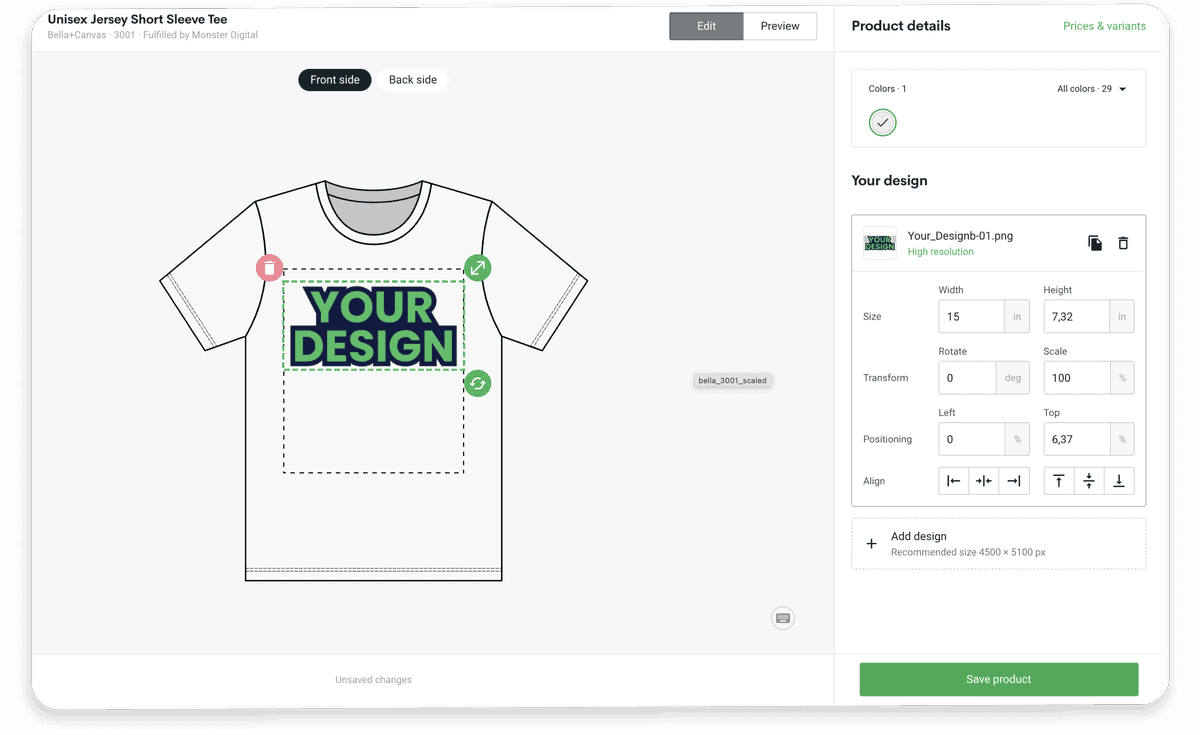
Hence with their mockup generators, you only have to provide your design, and they do the rest, engraving, shipping, packing, delivering.
Step 3 – Define Your Purpose for Starting a Business
First, think about why you want to start a business. Are you aiming for financial independence and a flexible lifestyle, or do you want to make a positive impact in your community?
Understanding your motivation will help you focus and start a business, but have no ideas. This will help you match your goals and values.
You don’t need to compromise your personal life when you start your own business. In fact, it’s crucial to pick an idea that fits well with your current lifestyle. Consider your strengths, interests, and the resources you have.
Also, reflect on the lifestyle you desire. If you’re a night owl, a business requiring early mornings might not suit you. Alternatively, if family time is crucial, an online business or a model that generates passive income might be ideal.
Here are some modified questions to guide your choice:
- Do you see yourself traveling often, or do you prefer a business that allows you to stay rooted in one place?
- What excites you more: offering a service, creating a product, or perhaps educating others?
- Are you looking for a venture that you can start and manage solo, or are you open to building a team?
- Do you have a specific hobby or passion that could be transformed into a business opportunity?
Reflecting on these questions will help you come up with new ideas or refine existing ones. Once you have a direction, start brainstorming potential business concepts based on your interests, skills, and goals.
You can also look into existing businesses and industries to spot opportunities for innovation.
However, remember, your first idea doesn’t have to be perfect; it can evolve as you learn more about your market and refine your approach.
Step 4- Spot Problems to Solve When You Start a Business but Have No Ideas
When thinking about starting a business but feeling stuck for ideas, look around and notice the everyday issues people face. Think about how you could build a business that provides a solution to these problems.
Start by considering the challenges you encounter daily, as well as those faced by your friends, family, or neighbors. This can lead to a business that offers a new product or service or improves an existing one.
For example, if you notice that many people in your community struggle with organizing their homes, you might start a professional organizing service.
Another example could be if you observe that local parents find it hard to find affordable, healthy snacks for their kids, you could launch a business that delivers healthy snack boxes.
If you see that small businesses in your area struggle with their online presence, you could offer digital marketing services to help them grow.
Additionally, there are numerous woodworking project businesses, like The Spruce Crafts, that can help you transform these ideas into reality. For instance, you could start a custom furniture business if you notice a demand for unique, handcrafted furniture in your community.
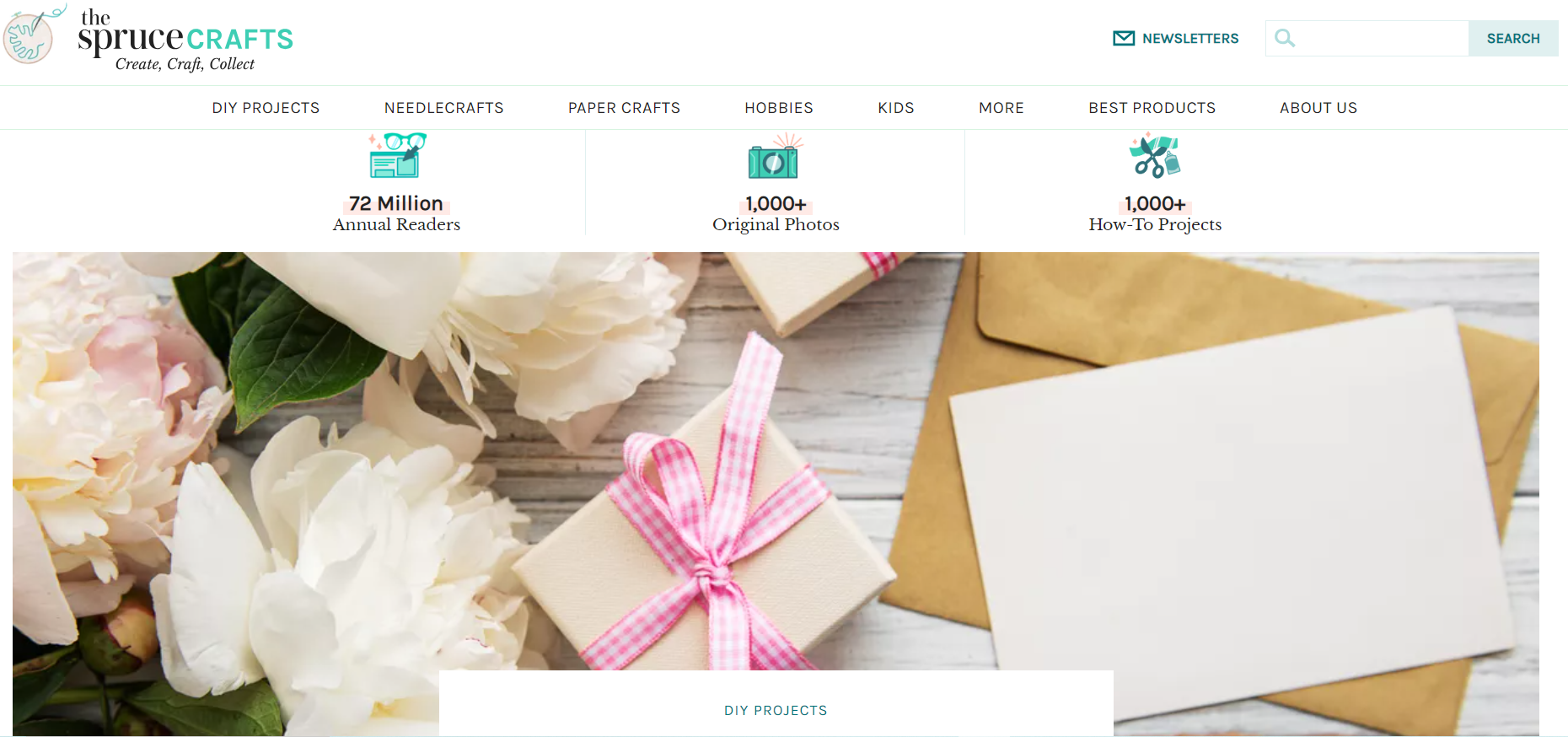
By identifying common problems and thinking creatively, you can turn everyday issues into profitable business opportunities.
Remember, the key is to keep an eye out for what could make life easier for people. This approach not only gives you a clear direction to pursue.
Also, it ensures your business idea is grounded in real needs, increasing its chances for success.
Step 5- Create a Business Plan When You Start a Business but Have No Ideas
If you’re ready to start a business but don’t have any ideas yet, don’t worry.
Once you’ve done your brainstorming and come up with a bunch of ideas, it’s time to plan and see which ideas are most affordable and economically stable.
If you have the time, you can do this process for all your listed business ideas.
Here’s how to craft a simple business plan that can guide your dropshipping venture:
Executive Summary
Even though it’s challenging when you start a business without ideas, the executive summary can clarify your vision.
It should summarize your business concept, mission, target market, product details, marketing strategy, and financial goals. Write this section last to reflect all key points from your business plan. For example:
- Business Name: Fresh Eats Delivery
- Location: Austin, TX
- Mission Statement: Dedicated to delivering fresh, organic meals to your door.
- Business Concept: Specializing in meal kits made from locally sourced, organic ingredients.
- Market Analysis: Targeting health-conscious individuals and busy professionals.
- Unique Selling Proposition: Quick, healthy, and customizable meal kits.
- Business Model: Subscription-based, ensuring steady revenue.
- Financial Summary: Projected $1 million in annual revenue with a 15% net profit margin within three years.
- Team Overview: Led by founders with a background in nutrition and culinary arts.
- Milestones: Achieved local partnerships with organic farms.
- Future Plans: Expanding to neighboring cities within five years.
Company Description
As you start your business, the company description offers a detailed look at your business’s structure, model, industry, and objectives. This helps lay a strong foundation for the rest of your plan.
Market Analysis and Customer Segmentation
Understanding your market is vital. Conduct thorough research to outline the industry, target audience, and competitors.
For example, if you’re launching Fresh Eats Delivery, research the local demand for organic meal kits, identify your competition, and segment your customers based on their dietary preferences and lifestyle. This will help you tailor your marketing strategies and product offerings to meet their needs.
For example, I personally use product research tools like Minea to pinpoint what customers need and get product details like product costs, customer engagement, potential profit margins, and more.
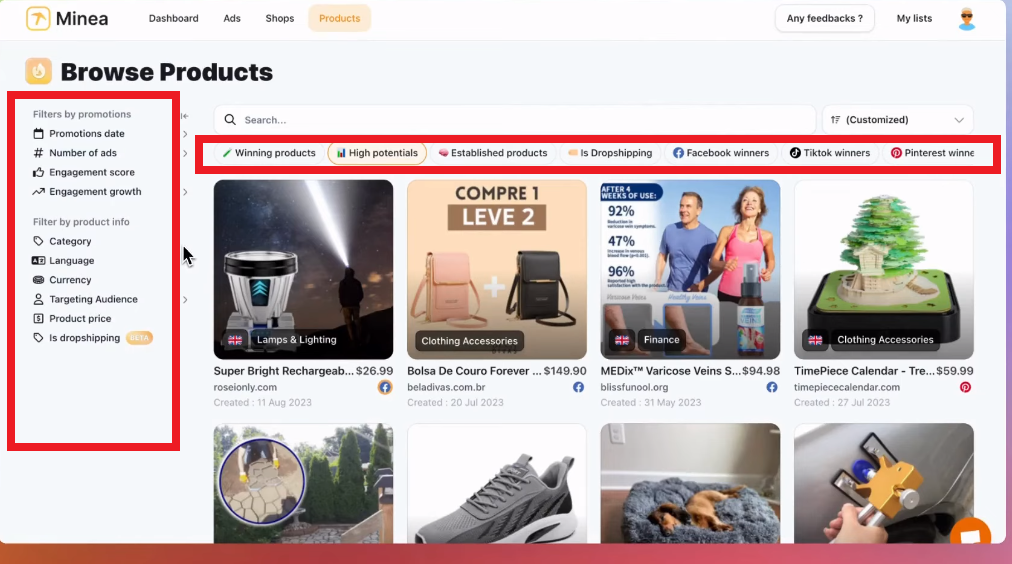
Also, I use competitor analysis tools to see what others are doing right or wrong. This step is crucial to verify the viability of your business idea.
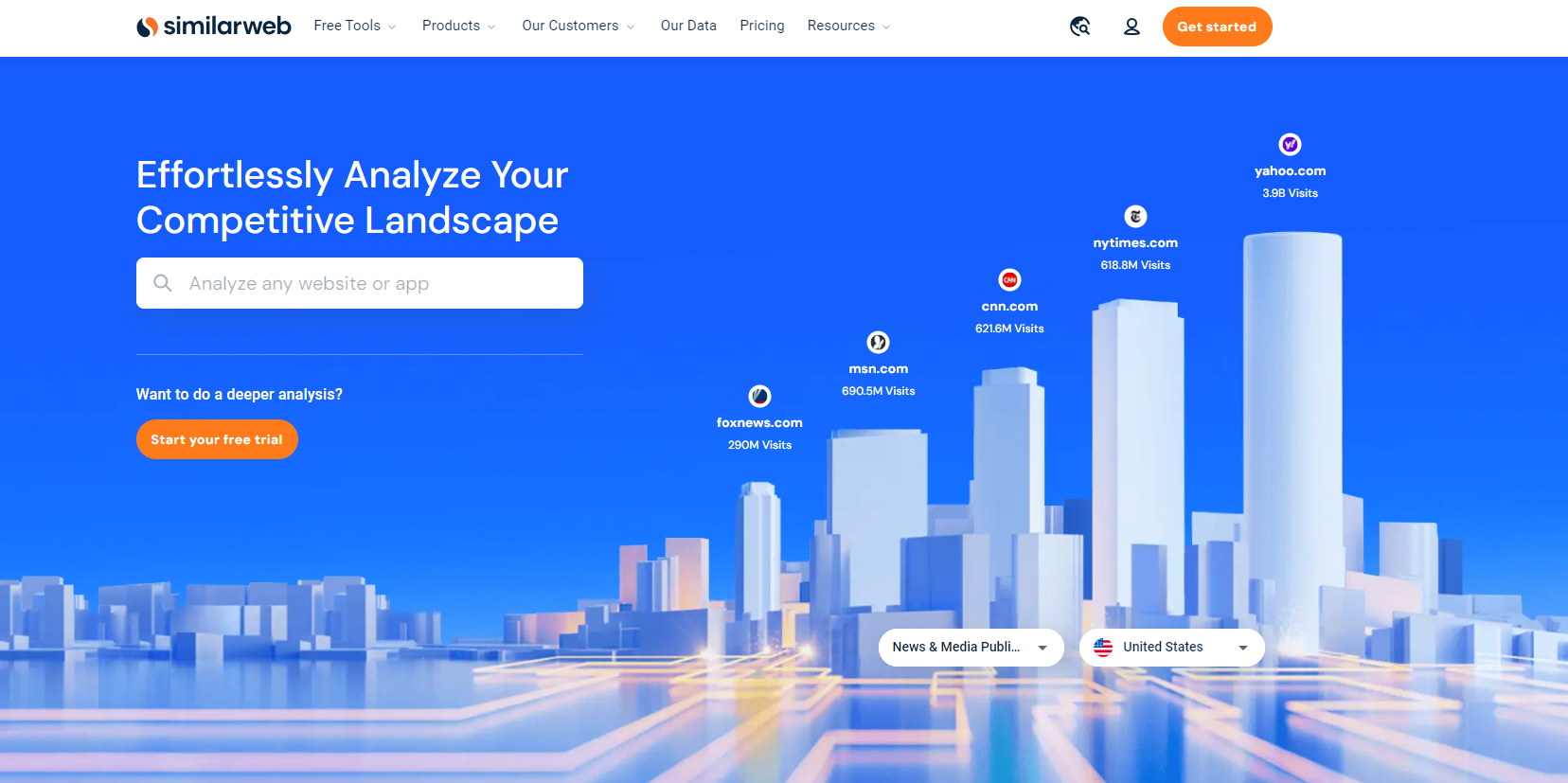
Product Details
Detailing your product is key when you start a business but have no ideas because it helps you focus on what you’re offering.
So, describe how your products stand out from the competition and their pricing structure. For example:
- Product/Service: XYZ Health Tracker, a mobile app that syncs with wearable devices.
- Key Features: Personalized health dashboards, activity tracking, sleep, and nutritional guidance.
- Pricing Strategy: Freemium model, with a premium tier for advanced features.
However, with today’s AI tools, you can do this in a blink of an eye. For example, I use ChatGPT prompts to write engaging product description. Check this out.
Sales and Marketing
A strong marketing strategy is essential when you start a business but have no ideas. It transforms vague concepts into actionable strategies.
Define your product positioning, pricing strategy, sales approach, and how you will promote your business through various channels, planning out a year’s worth of marketing activities.
For example, I recommend focusing on basic search engine optimization (SEO), social media marketing, email marketing, and paid ads. These tools are crucial for reaching more customers and building your brand’s presence online.
Next, to increase your sales, consider strategies like cross-selling and up-selling. Offering discount codes and starting referral programs can also help attract more customers and boost purchases.
Additionally, incorporating video marketing into your marketing strategy can be very effective. Hence, videos allow you to showcase your products appealingly.
Also, you can demonstrate how to use your products, and highlight their features and benefits. I also advise automating your marketing efforts where possible.
👉 Check out the 16 Best Marketing Apps On Shopify.
Logistics and Operations Plan
Outline how you will manage the operational aspects of your business.
Thankfully, today there are ecommerce automation tools that can help you streamline your business process from sourcing products to handling shipping and fulfillment.
For example, AutoDS can help you with automating order processing, price, and stock monitoring, and providing a centralized platform for order fulfillment and inventory management.
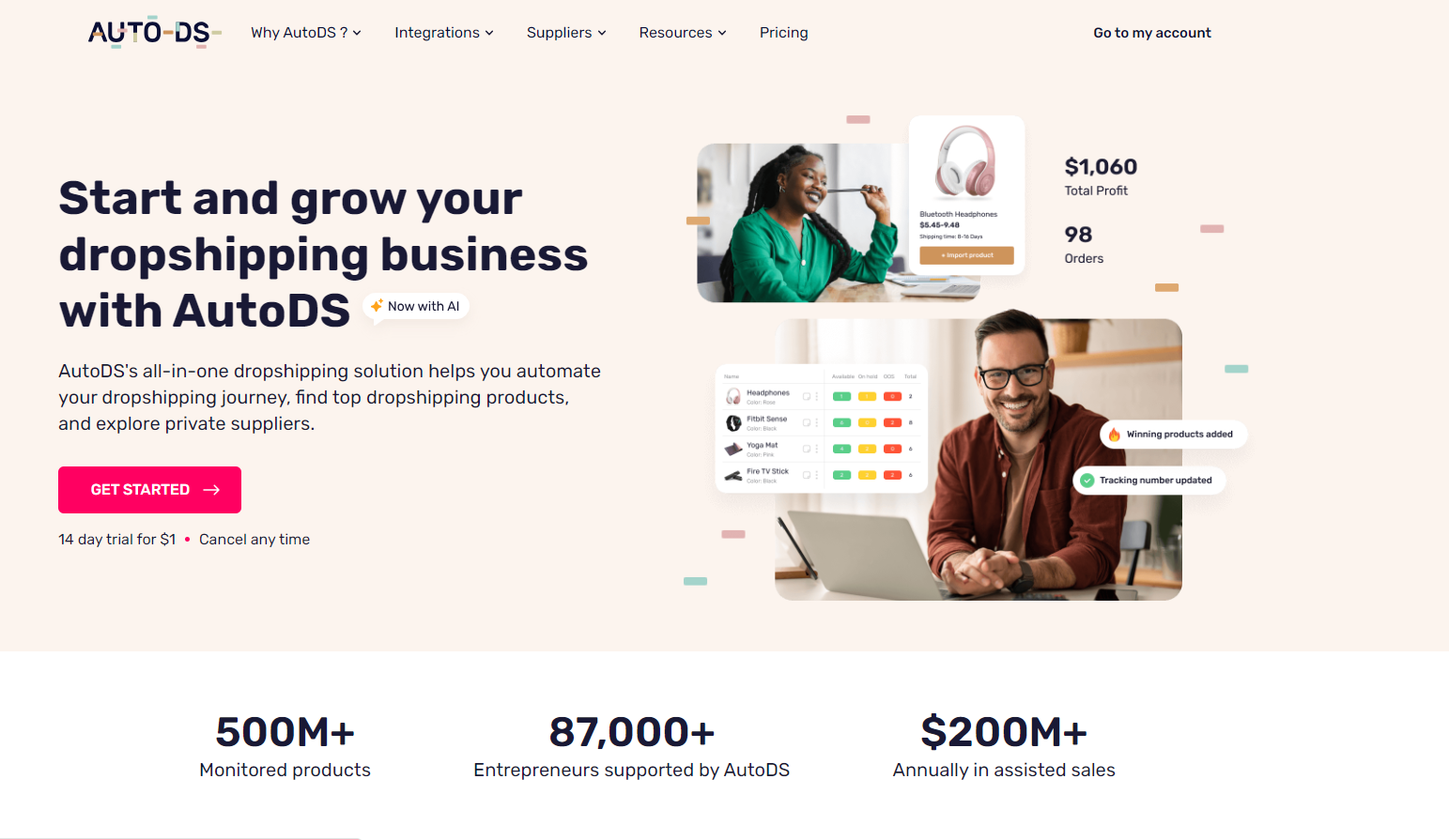
Financial Analysis
Finally, as you prepare to start a business but have no ideas, it’s crucial to understand the financial requirements.
Also, estimate your startup costs and forecast financial performance for at least the first year to ensure viability and plan for success.
Creating a business plan might initially seem daunting, especially when you’re looking to start a business but have no ideas.
However, following these steps will provide clarity, establish a strong foundation, and set you on a path to success.
Step 6- Try Out Your Ideas on a Small Scale
If you’re not sure which business idea to go with, it’s smart to start small. This approach lets you see if people are really interested in your product or service without a huge investment.
Testing your ideas on a smaller scale is a great way to check if your business could succeed.
For instance, instead of pouring lots of money into a physical storefront, why not launch an online store first? This way, you can measure customer interest and get valuable feedback without the high costs. If you’re thinking about consulting, start offering your services on a freelance basis before committing full-time.
By starting small, you can also fine-tune your offerings. It’s an effective way to make sure your product or service meets customer needs while conserving your time and money.
Top Business Ideas To Start With in 2024
Start A Dropshipping Business
If you want to start a business but have no ideas, consider dropshipping. It’s an e-commerce model where you sell products without needing to keep any inventory. By 2024, this business model will reach over $301.11 Billion in 2024.
To get going, you’ll need to learn how to pick suppliers, set up an e-commerce website, and market your business effectively. Platforms like Dropshipping.com are great for finding trustworthy suppliers.
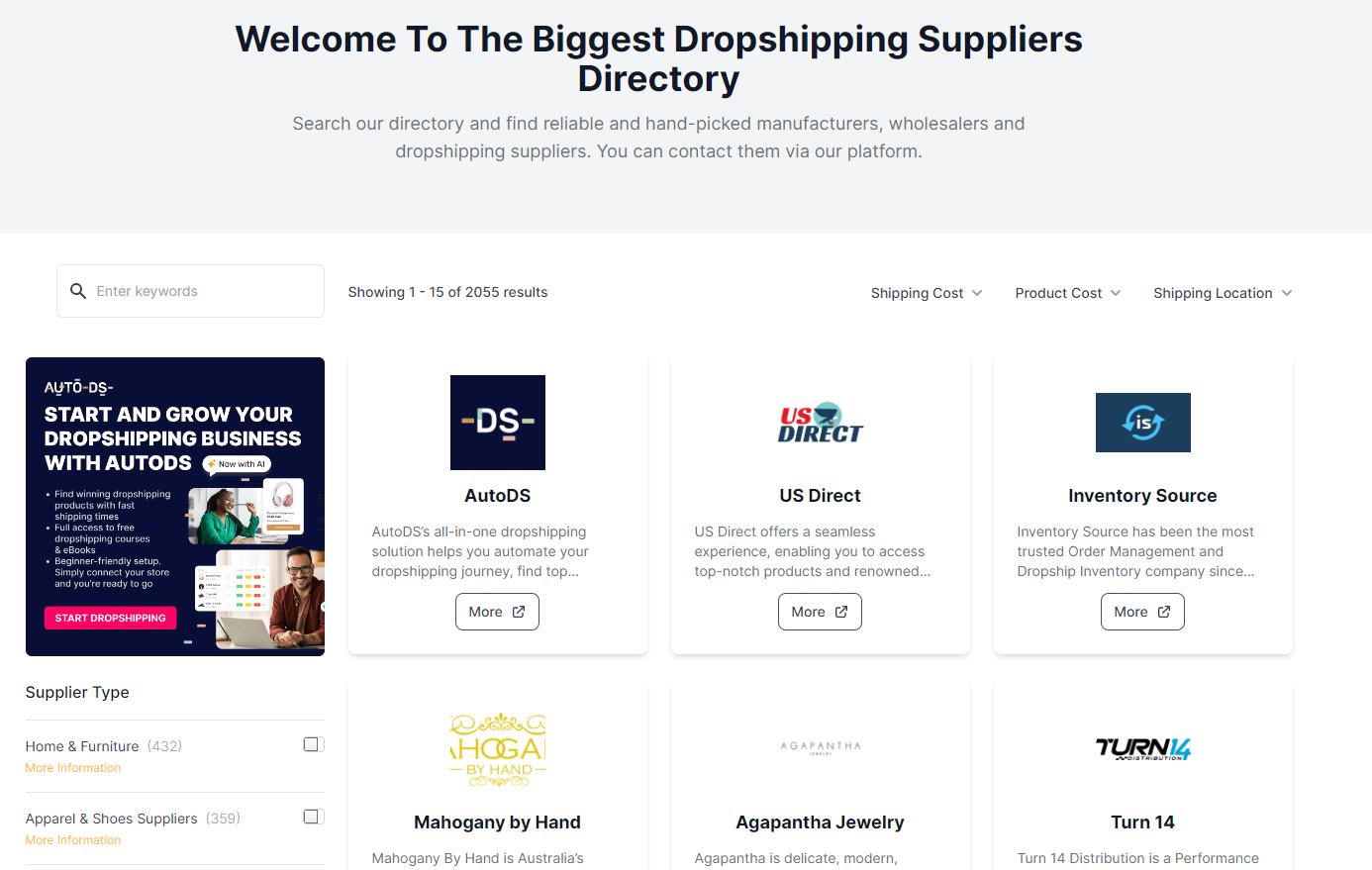
For building your website, tools like Shopify, WooCommerce, BigCommerce, or Wix are excellent choices.
I personally prefer Shopify because it’s easy to use, offers many pre-designed themes, and includes a drag-and-drop editor that lets you customize your store to your liking.
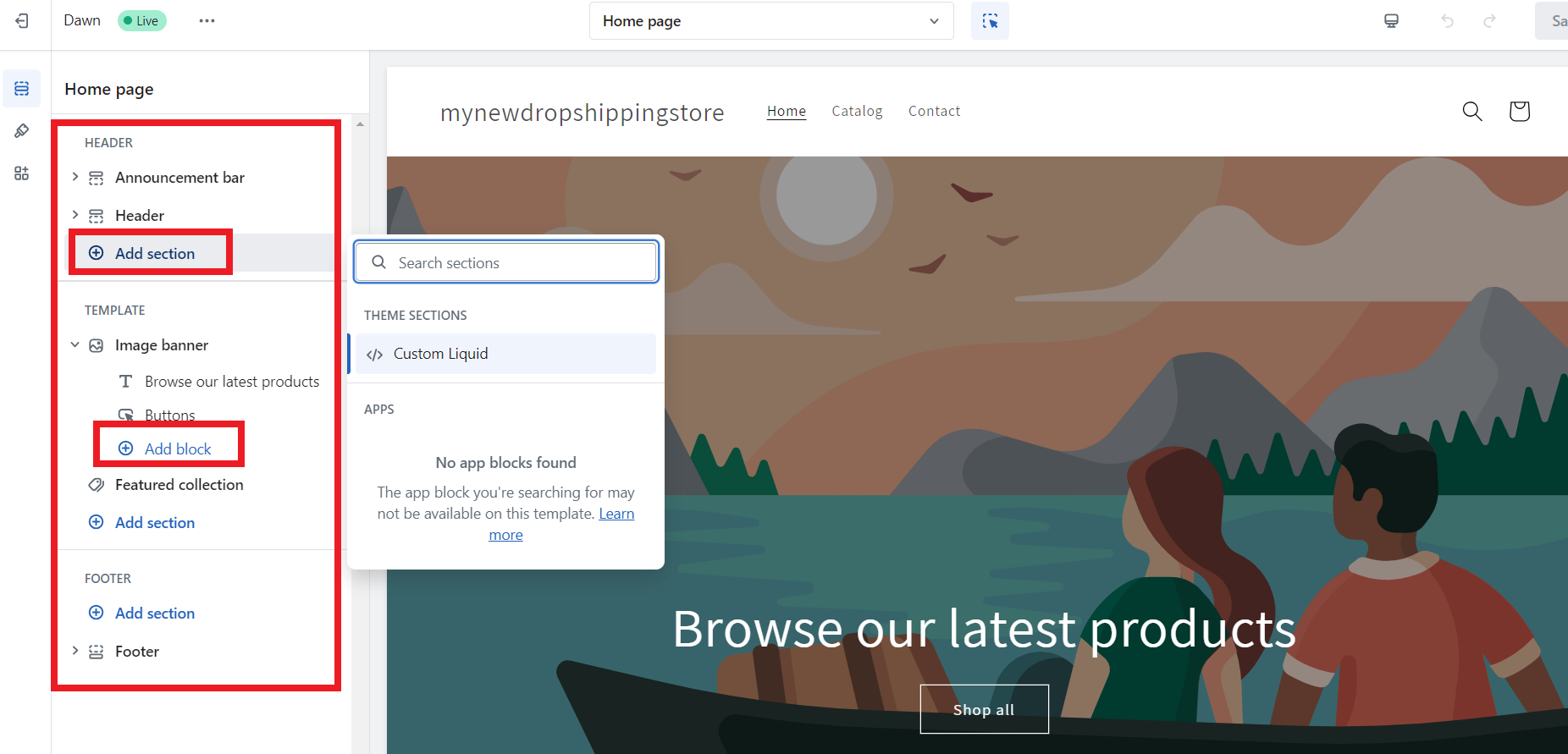
Extra Benefits — Shopify also works well with numerous third-party apps, which can really help you manage your online store smoothly.
Plus, what I actually did for my latest dropshipping business, I spent only a $1 on DSCOM AI-Generated Shopify store. Hence, they did all the job for me, and I just started selling.
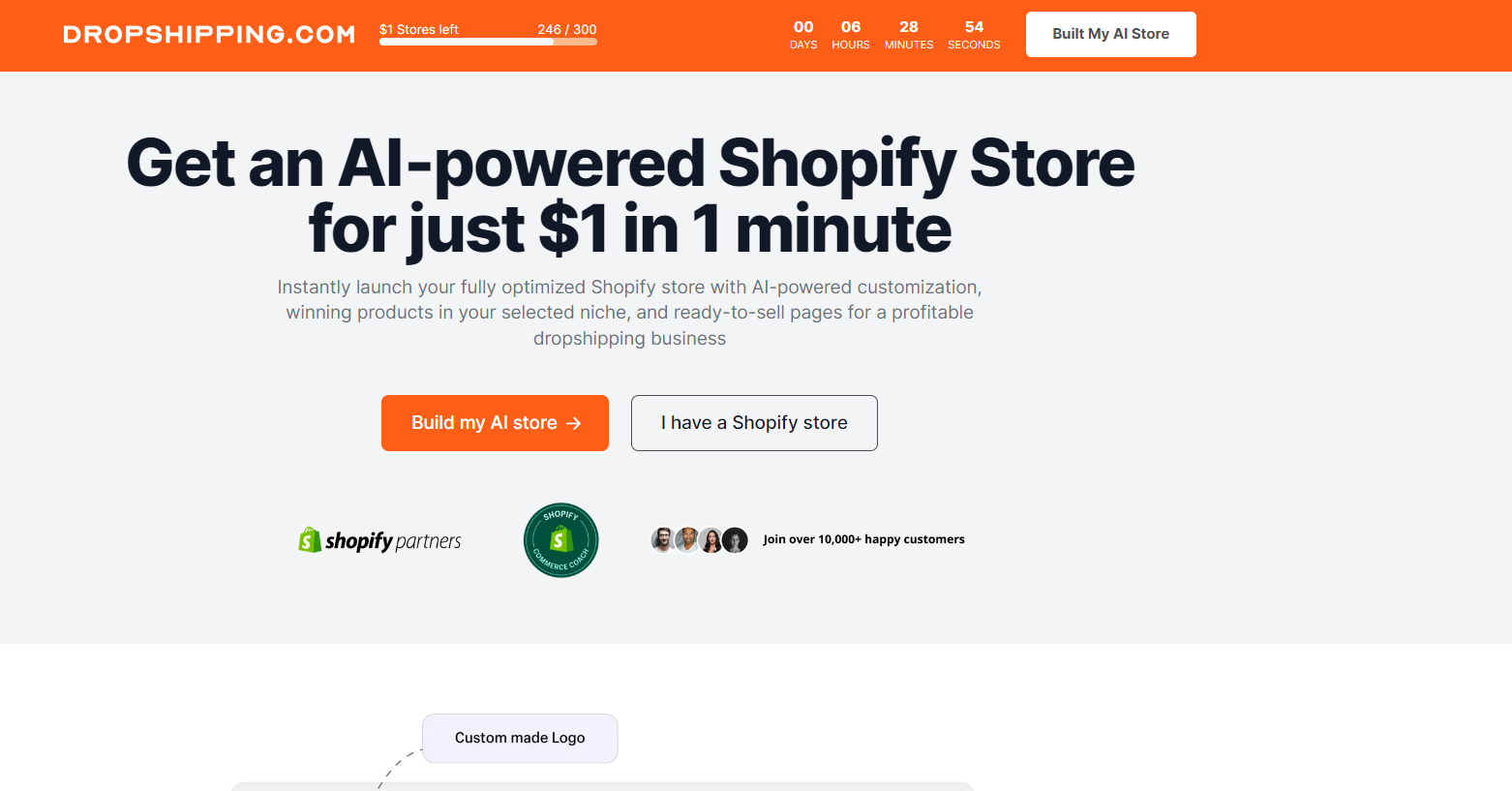
👉 Read about Is Dropshipping a Good Side Hustle To Start In 2024?
Start Selling Your Knowledge With Online Courses
If you want to start a business but have no ideas and you’re an expert in a particular field, why not share your knowledge by creating and selling online courses? This is one of the great business ideas for 2024.
Courses can vary widely in subject and can be priced anywhere from $20 to several hundred dollars. This depends on what you’re teaching and where you choose to host your course.
For instance, I always find it inspiring how the team at Dropshipping.com sells courses that help people learn how to start a dropshipping business. This shows how you can take specific knowledge and turn it into a profitable venture.
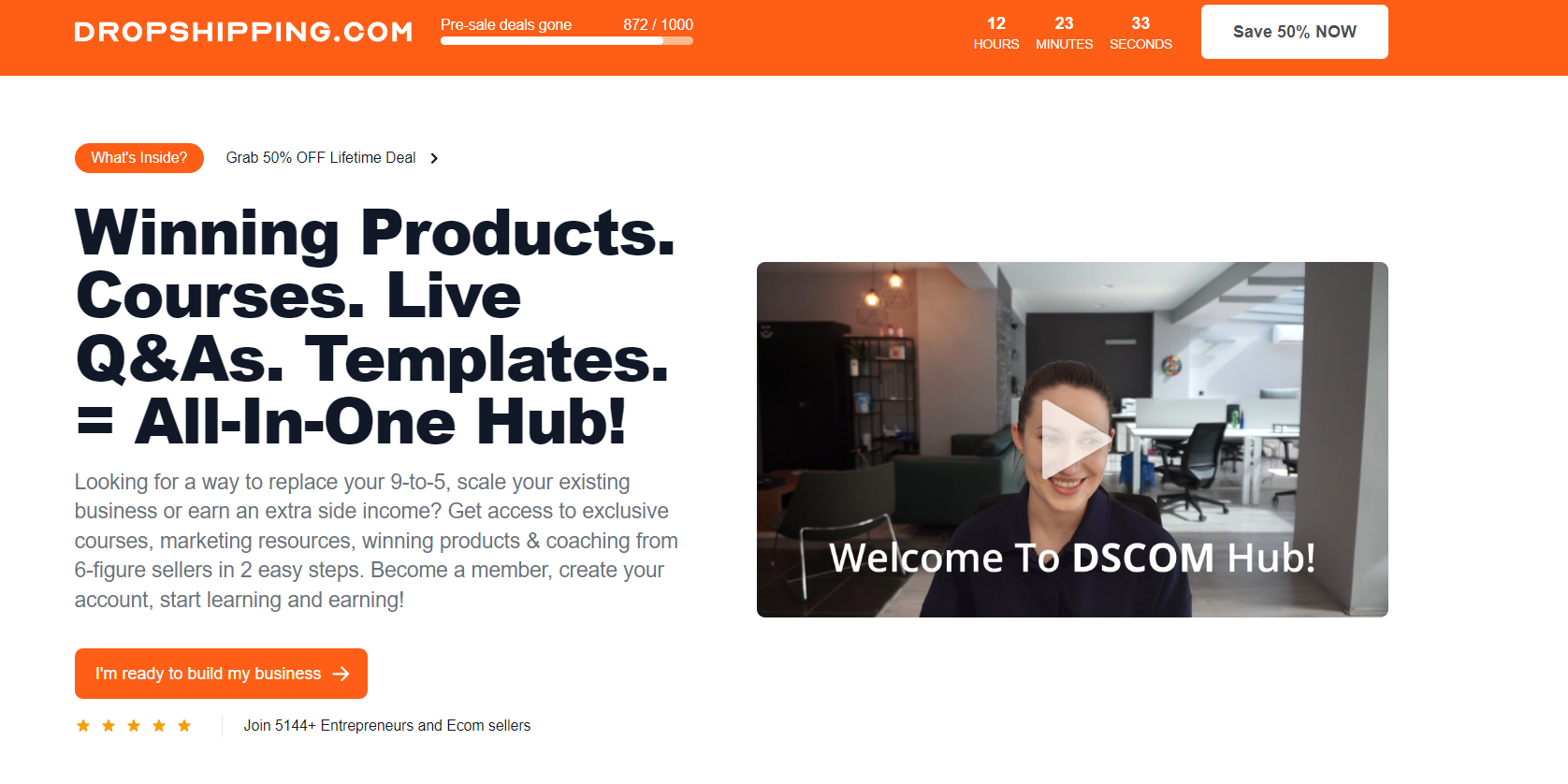
If you want to start a business but have no ideas, consider this path. It’s a powerful way to leverage your expertise and help others while also making an income.
Start a Print-on-Demand Business
One of the quickest and most creative ways to make money online is by starting a PoD business.
This model allows you to sell customized clothing designs without needing to print anything until a customer places an order. This approach is not only efficient but also minimizes waste.
Also, The PoD market size is booming, expected to jump from $7.67 billion in 2023 to $10.17 billion in 2024.
An exciting feature of this business is allowing customers to submit their own designs, which you can charge more for. This can help you build your brand more quickly.
Thankfully, numerous online platforms make it easy to get started with a PoD business.
For instance, I use Printful for my print-on-demand hats. This platform is user-friendly; you can select a product, add your design, and handle everything from the Printful dashboard.
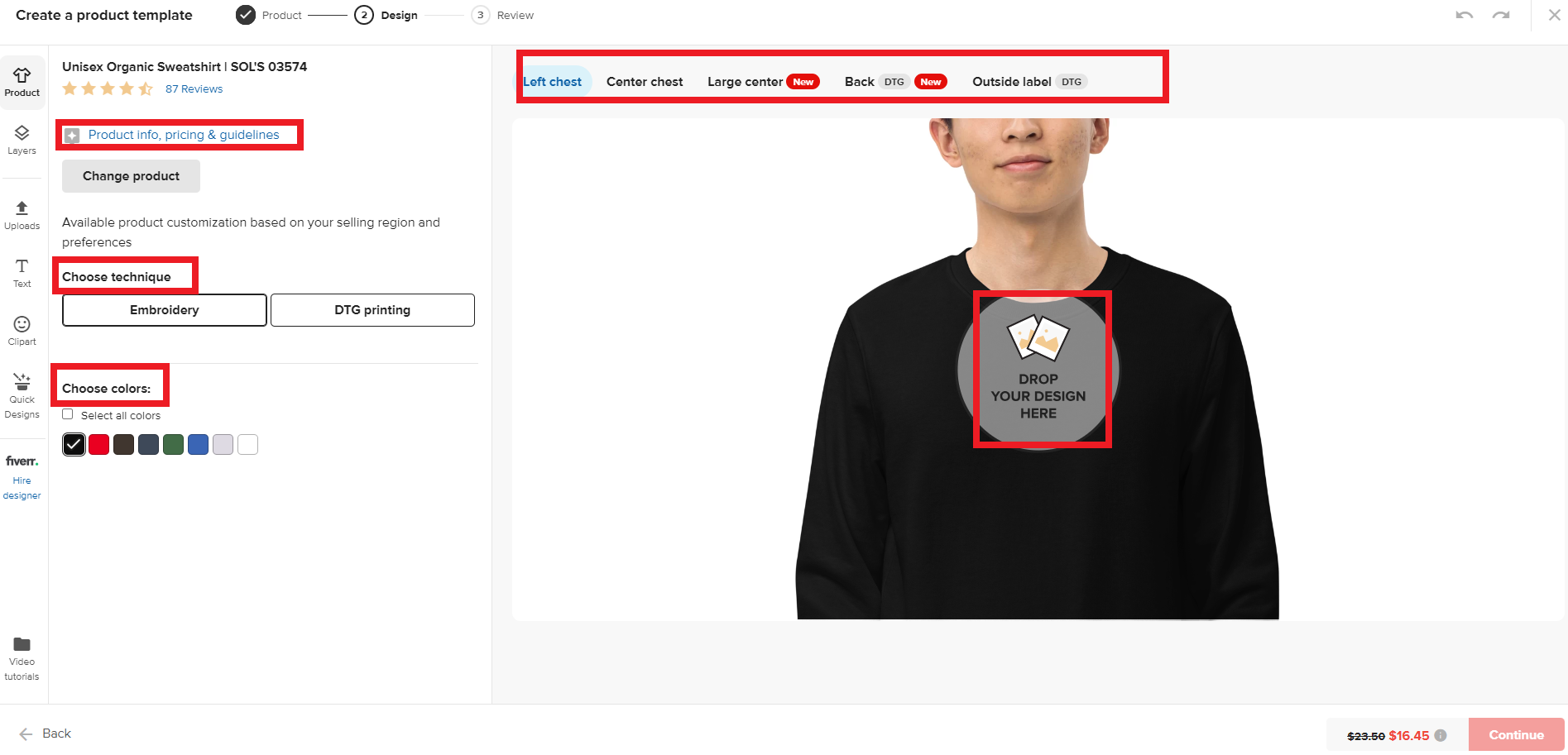
Their Mockup Generator is straightforward, letting you customize your design with text, graphics, quotes, and colors to suit your style.
Become An Influencer
It seems like every teenager wants to be popular, especially on social media. But could this desire actually be a lucrative business venture?
In the world of influencers, you can earn money by showcasing products in your unique style and vibe on platforms like Instagram and TikTok. The real earnings come from sponsored posts, collaborations, and affiliate promotions.
According to Google Trends, the interest in business ideas for teens, particularly in influencer marketing, is growing.

Take the example of Charlie D’Amelio. She started on TikTok by sharing dance and lip-sync videos and has grown into a teenage influencer with a massive following.
Now 19, she shares content related to her fashion style, vlogs about her daily preparations, and the brands she endorses. With over 151.6 million TikTok followers and 46.7 million on Instagram, she’s turned her social media presence into a significant buzz.
Let’s look at what influencers can earn, depending on their follower count:
- Micro-influencers (1,000 – 100,000 followers) often earn between $50 and $500 per post, influenced by their niche and how engaged their followers are.
- Mid-tier influencers (100,000 – 500,000 followers) can make $500 to $5,000 or more per post, depending on their audience’s size and interests.
- Macro-influencers (500,000 – 1 million followers) typically charge $5,000 to $20,000 per post.
- Mega-influencers (1 million+ followers) command $20,000 to several hundred thousand dollars for a single post, with top celebrities and highly popular influencers often earning even more.
This shows that becoming a social media influencer can be more than just a dream for teens; it can be a viable way to make significant money, turning social media activity into a full-fledged business.
Start A Podcast
If you’re more of a talker than a writer and want to start a business but have no ideas, podcasting might be the perfect fit. It lets you share your thoughts, opinions, and stories with people all over the world.
Plus, you can connect with others who share your interests, helping you build a community around your podcast and interact with listeners via social media.
Podcasting is gaining popularity, and surprisingly, not many podcasts are run by teenagers. This opens a great opportunity for you to stand out and potentially make money as a teen.
While growing a podcast can be challenging compared to blogging or YouTube—since finding new podcasts isn’t always easy—it can also be quite cost-effective.
For example, Spotify is a great platform to start your Podcast business. In fact, the platform has 602 million monthly active users, and 236 million paying subscribers. Also, there are over 5 million podcasts.

For example, Dropshipping.com has its own podcast teaching users everything about dropshipping. This really helps their loyal customer base.
Start Selling On Popular Online Marketplaces
If you want to start a business but have no ideas, selling on online marketplaces is a lucrative option, especially for teens.
First, you need to pick a niche—this means deciding what kind of products you want to sell.
Next, find popular online marketplaces like eBay, Etsy, AliExpress, Etsy, or Amazon where you can list your items.
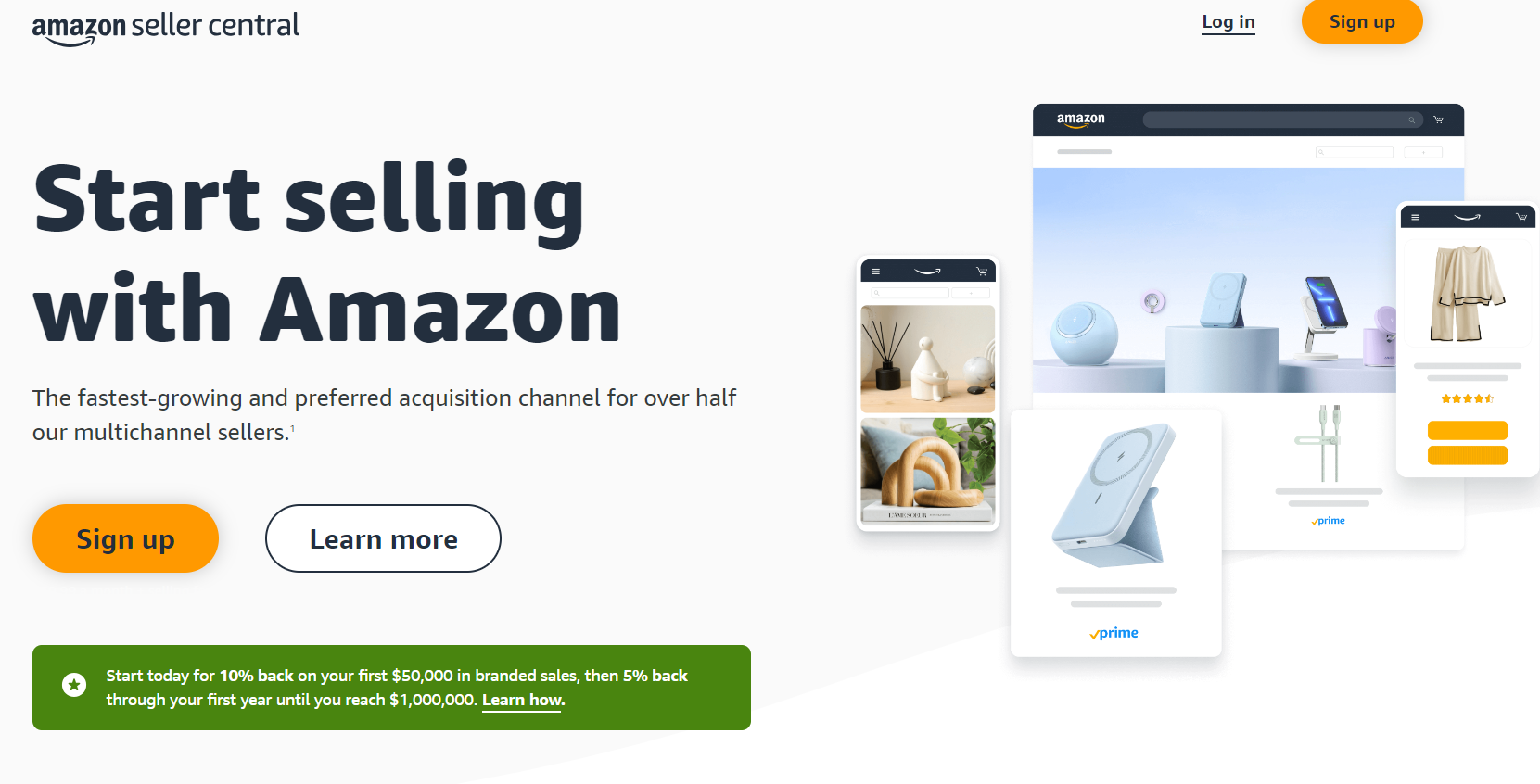
💡 Tip: Learn How To Sell On Amazon Without Inventory.
Here’s an inspiring story that might motivate you:
Alex Philip is a remarkable example of young entrepreneurial success in dropshipping. He began his journey at just 11 years old by selling Pokemon toys on Amazon. By the time he was 15, Alex had earned over $2 million by sourcing products from Alibaba and selling them on Shopify.
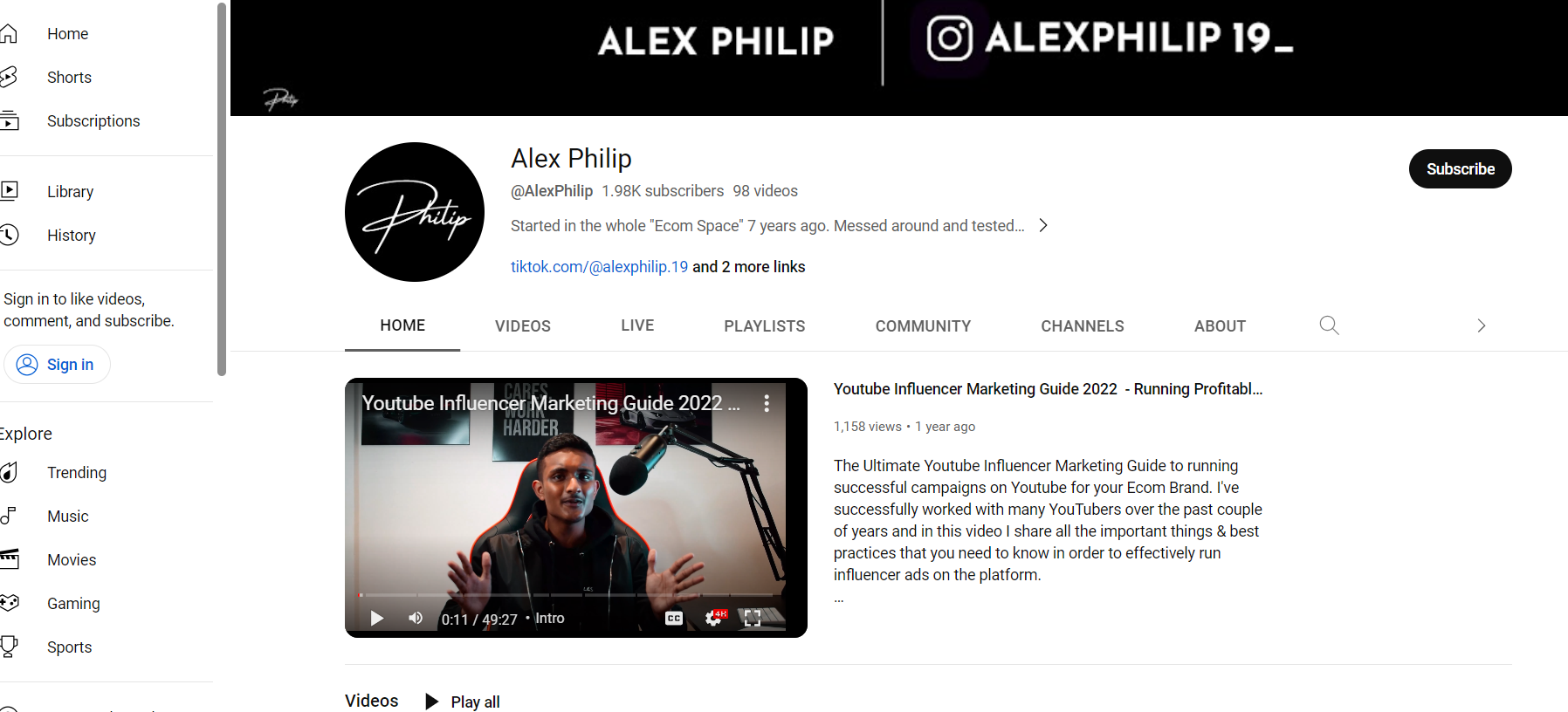
In 2017, Alex adapted his strategy to embrace the dropshipping model. Now, he sources products from Chinese suppliers and attracts customers to his Shopify dropshipping store. His story shows how starting small can lead to significant achievements in the online business world.
Create And Edit Videos
If you want to start a business but have no ideas, video creation and editing could be an exciting avenue to explore.
This field allows you to express your ideas, skills, and unique perspectives through visual storytelling. Not only will you learn to use video editing software and understand visual storytelling techniques, but you’ll also gain valuable insights into the world of multimedia production.
Getting involved in video creation and editing opens up a world of possibilities. You might find clients needing animations, short videos, or advertisements, each requiring a different set of skills and creativity. This means you have the chance to reach a diverse customer base, tailoring your services to a variety of needs.
Here’s an example of how this can become profitable: Suppose you develop strong video editing skills and create a successful portfolio; you could potentially earn a significant income.
Typically, video editors can charge anywhere from $15 to $80 per hour, depending on their skill level and the complexity of the projects they undertake.
So, if you want to start a business but have no ideas, consider tapping into video creation and editing.
Start Selling On Social Media Platforms
Starting a business by selling products on social media platforms like Facebook and Instagram leverages their vast reach and targeted advertising capabilities.

Both platforms boast billions of users worldwide, offering a massive potential customer base that is invaluable for new entrepreneurs, especially those who want to start a business, but have no ideas what to venture into.
These networks are particularly advantageous because of their visual nature, which is perfect for showcasing products through captivating images and videos.
When embarking on a social media business venture, the first step for those who start a business, but have no ideas, is to select products that visually appeal to users, such as fashion items, beauty products, home decor, or tech gadgets.
Next, create dedicated business accounts on both Instagram and Facebook, ensuring your profiles include comprehensive business information like contact details. It’s crucial to post high-quality content regularly, including product photos, how-to-use videos, and customer reviews, which all help boost product visibility.
Both Instagram and Facebook offer built-in shopping features, such as Instagram Shopping and Facebook Marketplace, which facilitate direct purchases within the platforms.
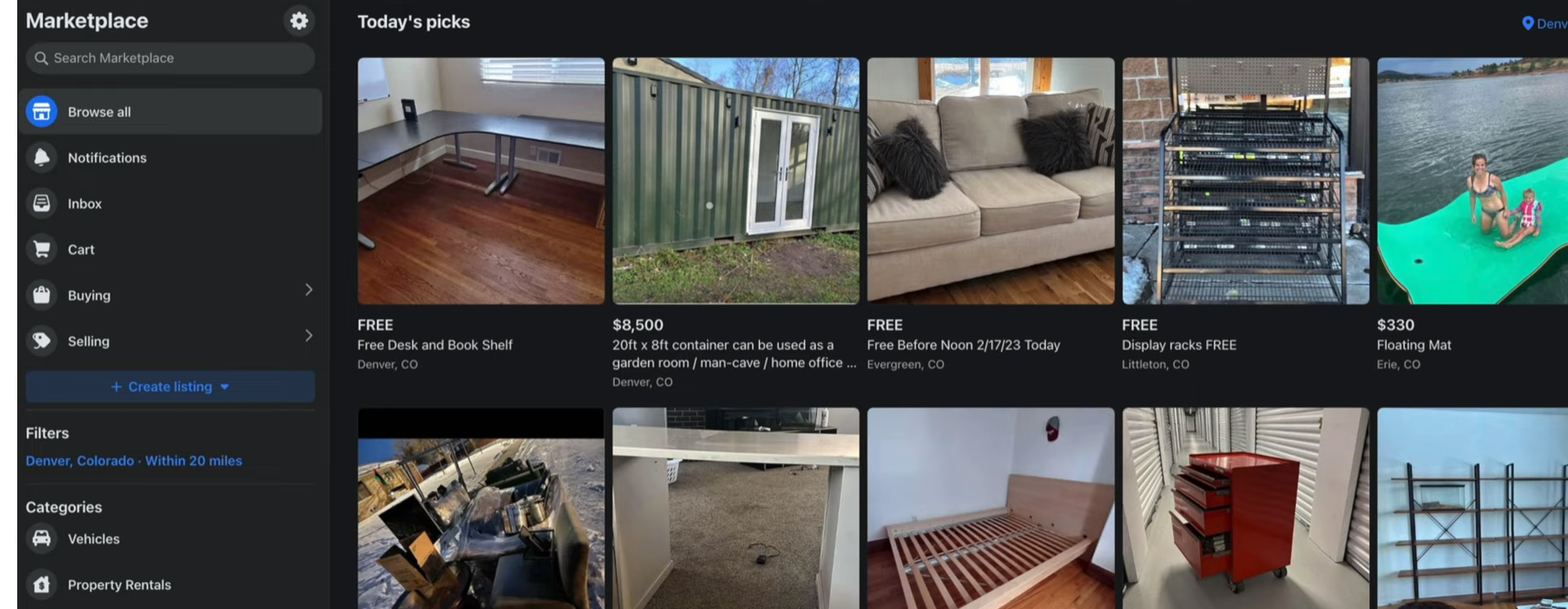
Running targeted ads is also a strategic move to extend your reach and attract more customers by creating campaigns that specifically target potential buyers based on their preferences and behaviors.
Most Inspiring Success Stories Of Entrepreneurs Having No Ideas How To Start
I find these stories of entrepreneurs that right now are actually millionaires. Firstly, they wanted to start a business but had no ideas. So, let’s get inspiration from their stories.
Jordan Welch
Jordan Welch’s story is a fantastic source of inspiration for anyone who wants to start a business but has no ideas.
He embarked on his entrepreneurial path at just 13, dabbling in ventures like reselling shoes and creating a clothing line during his middle and high school years. Despite not turning a profit by the time he graduated, these early experiences set the stage for his later success.
He first tasted significant success through dropshipping products on Shopify, where his e-commerce store quickly surpassed $1 million in sales within just eight months.
This initial success prompted Jordan to transition from dropshipping to creating his own brand, selling custom products online.
In 2018, he launched Viral Vault, a comprehensive e-commerce toolkit designed to help beginners start their own online stores. While it didn’t generate profit in its first year, Jordan’s determination soon turned it into a profitable endeavor.
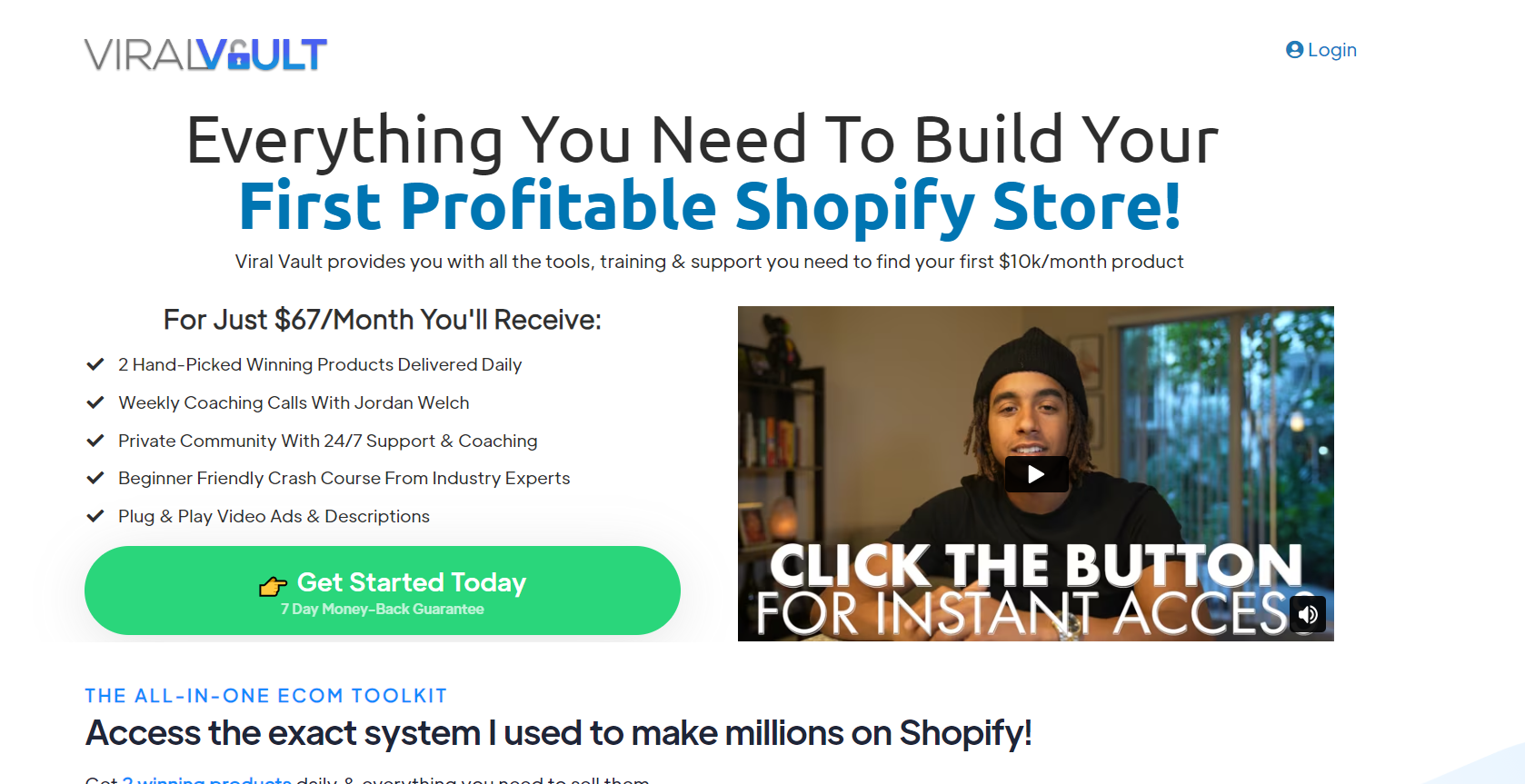
Parallel to his business career, Jordan began a YouTube channel in 2017, sharing his strategies for online business. Thanks to his consistent and quality content, Jordan grew his channel to over 1.45 million subscribers.
Jordan’s impressive earnings come from multiple sources: his Shopify store, YouTube ads, brand deals, affiliate promotions, and significant investments in index funds and cryptocurrencies. His diverse income streams have contributed to an estimated net worth of $4 million.
As of April 2024, Jordan’s YouTube channel boasts 249 videos, ranging from tutorials to interviews with billionaires, attracting viewership numbers from 200K to 3.6 million views per video.
Besides YouTube, Jordan has an active Instagram presence with 267K followers and a growing TikTok network where he shares shorts about Shopify, dropshipping, and business tips.
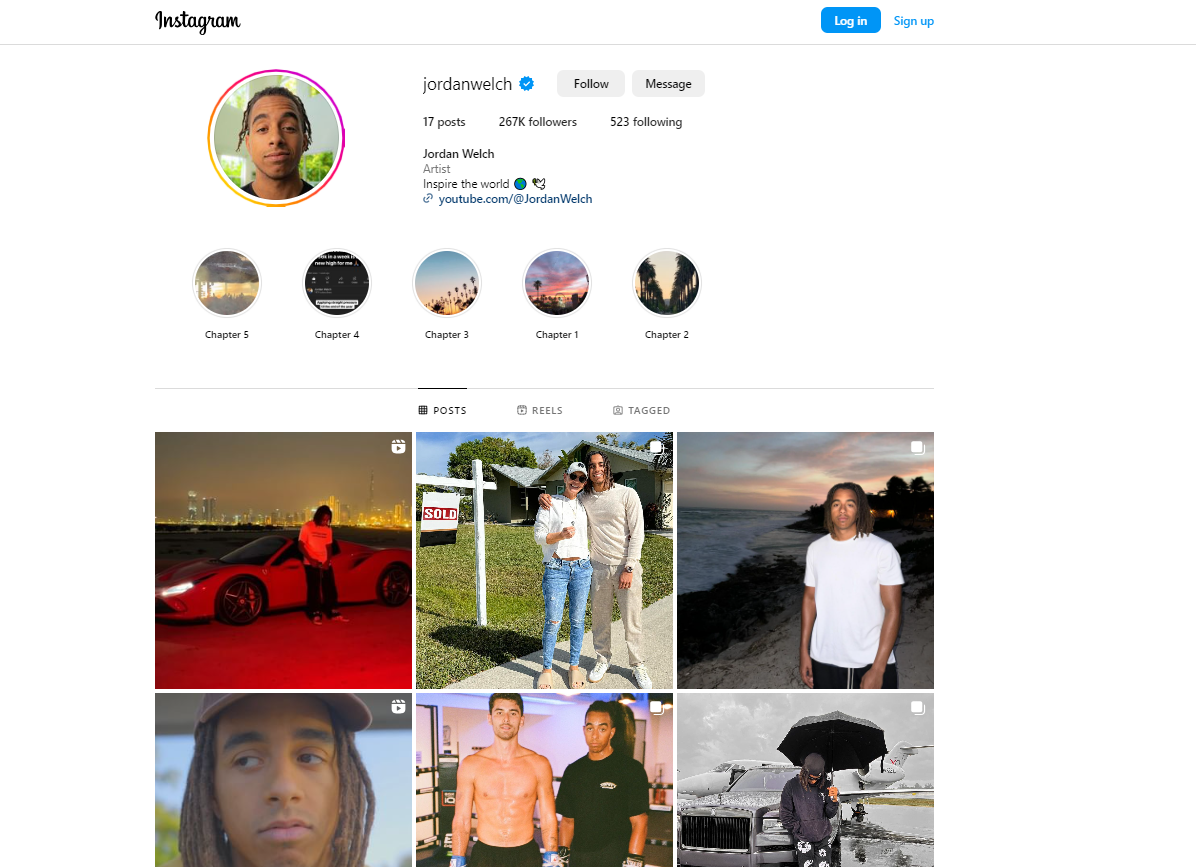
AC Hampton

Alex Hampton, commonly referred to as AC, hails from Kansas City, Missouri. He earned his Bachelor of Business Administration from the University of Missouri in 2018.
AC’s journey into the world of dropshipping began during his college days, sparked by a conversation with a roommate. After graduating, he briefly worked a traditional 9-5 job but soon felt compelled to venture into entrepreneurship. He invested in a dropshipping course, though the initial results didn’t meet his expectations.
In a pivotal moment in December 2018, AC discovered a winning product that generated $165K in sales in just two months. Initially, he fulfilled orders through AliExpress, but as order volume increased, he switched to Oberlo and eventually partnered with a supplier who could handle all fulfillment duties.
By March 2019, despite challenges like his product reaching saturation, a Facebook ad account shut down, and a PayPal account hold, AC was undeterred. He revamped his strategy, focusing on a niche, one-product store with a new theme. This shift led to astonishing results, with sales exceeding $1.7 million from March to December 2020.
Since then, AC’s e-commerce endeavors have continued to thrive. He has made millions from various online stores and now shares his expertise through his online course, Supreme Ecom Blueprint. This course is a treasure trove of knowledge for those aspiring to succeed in e-commerce.
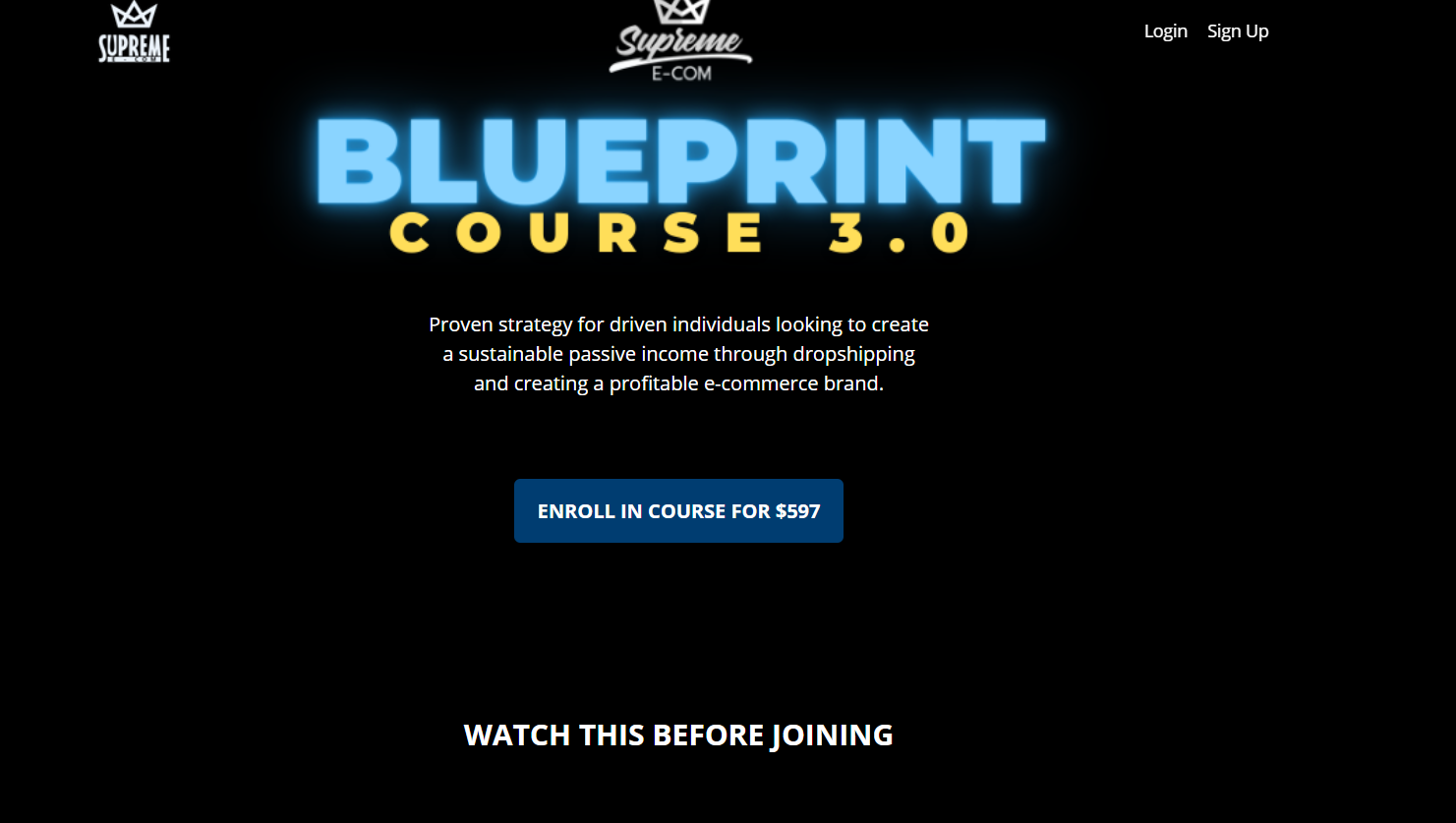
AC’s story is a testament to the resilience and innovation needed in the digital marketplace, making it a motivating case study for anyone who might want to start a business but has no ideas. His journey illustrates how a shift in strategy and persistence can lead to remarkable success in the world of e-commerce.
Justin Woll
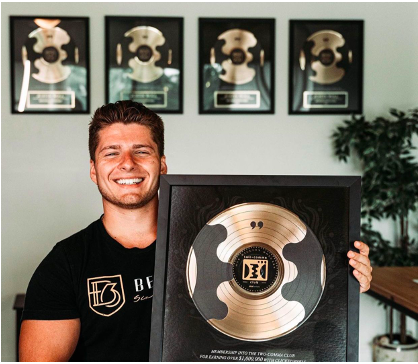
Justin Woll, a 23-year-old entrepreneur from Wayne, New Jersey, has rapidly ascended to prominence in the e-commerce world, becoming a self-made millionaire.
His journey began in a middle-class family facing financial difficulties, which spurred his early interest in marketing and sales. By age 15, Justin had already started his own gaming company, LINK, and went on to launch two subscription box businesses and two Shopify stores.
Recognized for his entrepreneurial spirit with the Rutgers Entrepreneurship Award in 2016, Justin founded Beyond Six Figures the following year, focusing on e-commerce and dropshipping. He’s known for his adept use of Facebook to boost sales and grow his ventures.
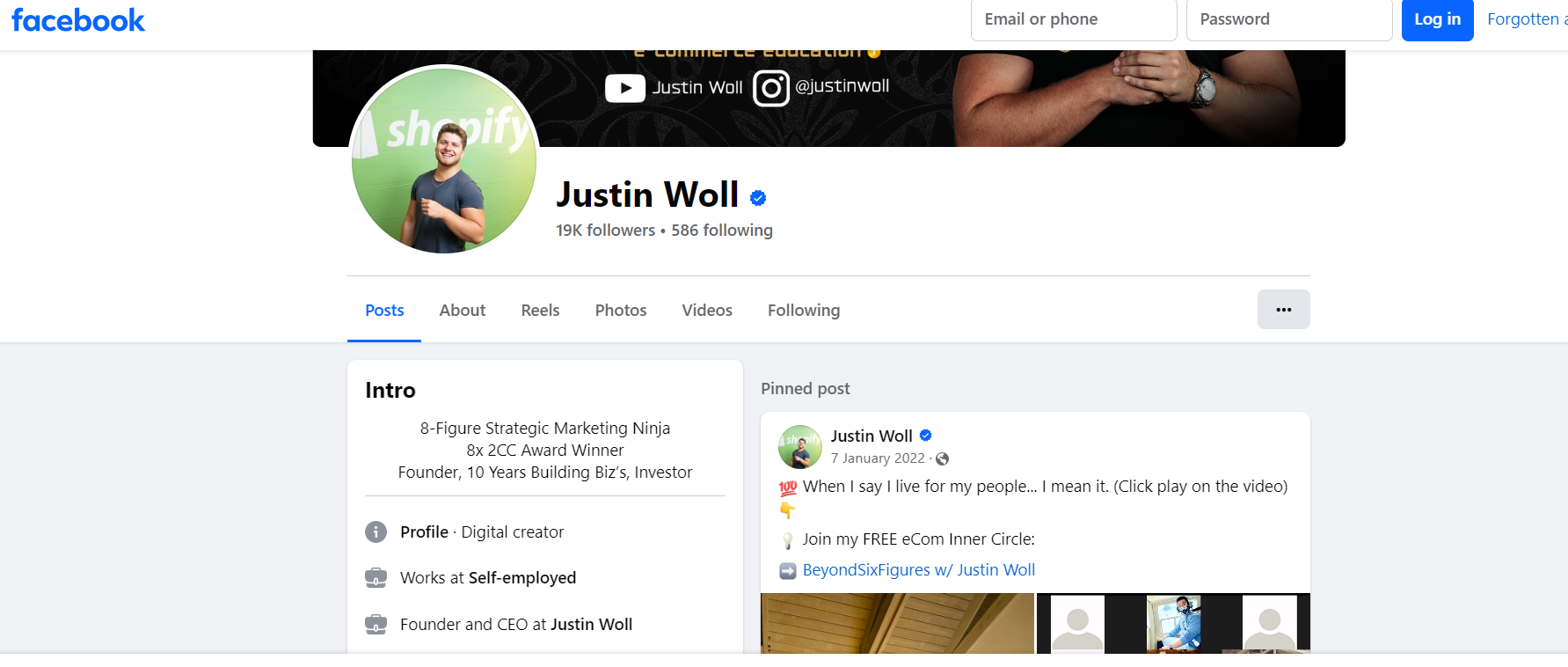
In addition to running successful online businesses, Justin has also become a respected educator in the digital marketing space.
With three ‘Two Comma Club‘ awards under his belt and leadership in a major personal e-commerce mentorship agency, Justin continues to influence the e-commerce industry profoundly.
His personal and professional journey is followed by over 210k people on Instagram and many more across other social platforms, where he shares insights and motivates others to succeed in their e-commerce endeavors.
Sebastian Ghiorghiu
Sebastian Ghiorghiu recognized as one of the richest dropshippers in 2024, embarked on his entrepreneurial journey by tapping into the emerging popularity of dropshipping. He quickly identified a profitable niche and selected high-demand products, which propelled his first dropshipping store to generate $35,000 in revenue.
Sebastian opted to focus on Facebook ads rather than Instagram influencer marketing, a strategy that paid off by effectively targeting his audience across Facebook and Instagram.
His foray into YouTube further amplified his success; his initial video explaining how he made $10,000 in revenue using Shopify caught viewers’ attention. He followed this with another video that went viral, significantly boosting his earnings through ad revenue and affiliate deals.
Leveraging organic traffic through search engine optimization, Sebastian enhanced his online store’s visibility, attracting a steady influx of potential customers. This exposure also provided him with the perfect platform to launch his first dropshipping course, quickly turning it into a lucrative venture with sales soaring to $70,000 to $80,000 per month.
With his earnings, Sebastian began taking dropshipping more seriously, creating a dedicated brand and investing heavily in research and development. This move saw his income skyrocket to between $500K to $2.3 million. At just 24 years old, Sebastian now runs a Google Ads agency, multiple dropshipping stores, and a successful YouTube channel.
His achievements in dropshipping have enabled him to reach millionaire status, purchase his dream house, and buy a dream car, illustrating the transformative potential of starting a business in dropshipping.
Start A Business With No Ideas -FAQs
1. How to Balance Risk and Reward When Starting a New Business.
Starting a business, especially when you start a business but have no ideas, can be daunting due to the uncertainties involved. Balancing risk and reward begins with a thorough market analysis to understand potential challenges and opportunities.
Conducting this analysis helps in identifying a niche with a demand that matches your skills and interests, reducing the inherent risk.
Financial planning is also critical; setting a clear budget and understanding your financial thresholds can prevent overspending.
Consider starting small to test your concept without committing substantial resources. This incremental approach helps in minimizing risks while allowing for flexibility to pivot or scale based on initial feedback and success.
2. What Specific Legal Considerations Should I Be Aware of When Starting a Business in 2024?
Legal considerations are fundamental when you plan to start a business but have no ideas initially.
Business registration is a primary step, as it legitimizes your venture and may be necessary for tax purposes.
Depending on the business structure you choose, such as sole proprietorship, partnership, LLC, or corporation, the liabilities and tax obligations will vary.
💡 Tip: Read about LLC vs LLP: What’s The Big Difference?
Intellectual property protection is crucial, especially if your business idea involves unique products, services, or content.
Ensure compliance with local, state, and federal regulations, which may include obtaining specific licenses and permits.
For online businesses, understanding e-commerce laws, such as customer privacy and data protection, is also essential.
3. How Can I Effectively Market My Business with a Minimal Budget?
Marketing on a minimal budget requires creativity and a strategic approach.
Social media platforms offer a cost-effective way to reach a broad audience.
Creating engaging content that resonates with your target demographic can build a strong online presence.
Utilizing email marketing is another efficient method to connect directly with customers by sending updates, promotions, and personalized messages.
Collaborations with other businesses or influencers can also increase visibility without the need for a large marketing budget.
Lastly, the use of customer testimonials and word-of-mouth can be powerful—satisfied customers are likely to recommend your business to others, driving organic growth without significant financial investment.


Conclusion
Starting a business can feel overwhelming, especially when you initially have no ideas. So, in my blog, I empower you with the tools and mindset necessary to uncover and develop a successful business concept from scratch.
Begin by exploring your passions and skills to find a business that aligns with your interests and lifestyle. Understand the importance of solving real-world problems, which ensures your business idea is both relevant and needed.
A well-crafted business plan will clarify your vision, while testing your ideas on a small scale can validate their potential with minimal risk.
As you move forward, stay informed about emerging trends to spot opportunities in the evolving market. By focusing on these strategies, you can confidently start your entrepreneurial journey and build a foundation for success in 2024 and beyond.













![The Top 21 3PL Companies Compared [2024 List & Guide]](https://images.weserv.nl/?url=https://prod-dropshipping-s3.s3.fr-par.scw.cloud/2024/03/Frame-3922469.jpg&w=420&q=90&output=webp)